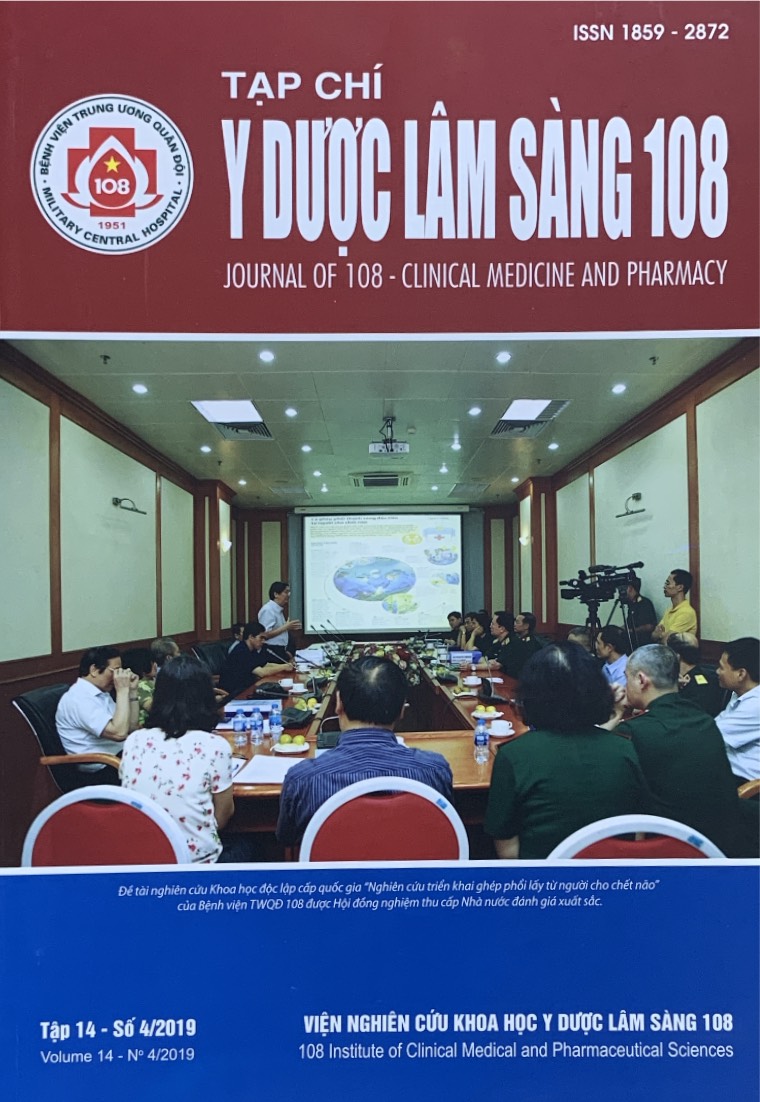Kết quả điều trị ung thư biểu mô tế bào gan không còn chỉ định phẫu thuật bằng phương pháp tắc mạch xạ trị với hạt vi cầu gắn Yttrium-90
Main Article Content
Keywords
Tóm tắt
Mục tiêu: Đánh giá hiệu quả điều trị của tắc mạch xạ trị bằng hạt vi cầu nhựa gắn Yttrium-90 và xác định các yếu tố tiên lượng trên bệnh nhân ung thư biểu mô tế bào gan không còn chỉ định phẫu thuật. Đối tượng và phương pháp: Gồm 97 bệnh nhân ung thư biểu mô tế bào gan không có chỉ định phẫu thuật, được điều trị tắc mạch xạ trị từ tháng 10/2013 đến tháng 3/2019. Thiết kế nghiên cứu hồi cứu theo dõi dọc, đánh giá thời gian sống còn dựa vào phương pháp Kaplan - Meier, đánh giá các yếu tố tiên lượng tác động đến thời gian sống còn của bệnh nhân bằng kiểm định Log rank và hồi quy Cox. Đánh giá đáp ứng khối u theo tiêu chí mRECIST. Kết quả: 97 bệnh nhân (90 nam, 7 nữ, tuổi trung bình 60,4 ± 12,3) được điều trị tắc mạch xạ trị, thời gian theo dõi trung bình 16,4 tháng (1,8 - 62 tháng). Thời gian sống toàn bộ (OS) trung bình 23,9 ± 2,4 tháng và tỷ lệ sống còn toàn bộ 3 năm là 39,2%. Đáp ứng tổng thể khối u theo mRECIST sau 6 tháng, đáp ứng hoàn toàn 12 (18,8%), đáp ứng 1 phần 23 (35,8%), bệnh ổn định 8 (12,5%) và bệnh tiến triển 21 (32,8%). Các yếu tố liên quan đến OS gồm tuổi ≥ 65, giai đoạn B theo hệ thống phân loại bệnh ung thư gan Barcelona (BCLC), kích thước khối u > 10cm, tỷ lệ thể tích u/ thể tích gan > 25%, đáp ứng điều trị của khối u (CR/PR). Trong phân tích đa biến, vị trí u trên 2 thùy gan và đáp ứng của khối u (CR/PR/SD với PD) là yếu tố liên quan thời gian sống còn của bệnh nhân. Kết luận: Tắc mạch xạ trị là phương pháp điều trị hiệu quả ở bệnh nhân ung thư biểu mô tế bào gan không còn chỉ định phẫu thuật. Khối u khu trú ở 1 thùy gan và khối u đáp ứng với xạ trị là những yếu tố tiên lượng tốt đối với thời gian sống còn của bệnh nhân.
Article Details
Các tài liệu tham khảo
2. Forner A et al (2014) Treatment of intermediate-stage hepatocellular carcinoma. Nat Rev Clin Oncol 11: 525-535.
3. Güney İB (2017) HCC locoregional therapies: Yttrium-90 (Y-90) selective internal radiation therapy (SIRT). Journal of Gastrointestinal Cancer 48(3): 276-280.
4. Kolligs FT et al (2015) Pilot randomized trial of selective internal radiation therapy vs. chemoembolization in unresectable hepatocellular carcinoma. Liver Int 35(6): 1715-1721.
5. Lencioni R, Llovet J (2010) Modified RECIST (mRECIST) assessment for hepatocellular carcinoma. Seminars in Liver Disease 30(01): 52-60.
6. Llovet JM et al (2008) Sorafenib in advanced hepatocellular carcinoma. N Engl J Med 359: 378-390.
7. Llovet JM, Bruix J (2003) Systematic review of randomized trials for unresectable hepatocellular carcinoma: Chemoembolization improves survival. Hepatology 37(2): 429-442.
8. Mantry PS et al (2017) Selective internal radiation therapy using yttrium-90 resin microspheres in patients with unresectable hepatocellular carcinoma: A retrospective study. J Gastrointest Oncol.
9. Mazzaferro et al (2013) Yttrium-90 radioembolization for intermediate-advanced hepatocellular carcinoma: A phase 2 study. Hepatology 57(5): 1826-1837.
10. Meyer C et al (2017) Yttrium-90 radioembolization of unresectable hepatocellular carcinoma - a single center experience. OncoTargets and Therapy, Volume 10: 4773-4785.
11. Ozkan ZG et al (2015) Favorable survival time provided with radioembolization in hepatocellular carcinoma patients with and without portal vein thrombosis. Cancer Biotherapy and Radiopharmaceuticals 30(3): 132-138.
12. Pitton et al (2014) Randomized comparison of selective internal radiotherapy (SIRT) versus drug-eluting bead transarterial chemoembolization (DEB-TACE) for the treatment of hepatocellular carcinoma. CardioVascular and Interventional Radiology 38(2): 352-360.
13. Sangro B, Inarrairaegui M, Bilbao JI (2012) Radioembolization for hepatocellular carcinoma. J Hepatol 56: 464.
14. Sangro B et al (2011) Survival after yttrium-90 resin microsphere radioembolization of hepatocellular carcinoma across Barcelona clinic liver cancer stages: a European evaluation. Hepatology 54: 868-878.
15. Saxena A et al (2014) Yttrium-90 radioembolization is a safe and effective treatment for unresectable hepatocellular carcinoma: A single centre experience of 45 consecutive patients. International Journal of Surgery 12(12): 1403-1408.
16. Salem R et al (2011) Radioembolization results in longer time-to-progression and reduced toxicity compared with chemoembolization in patients with hepatocellular carcinoma. Gastroenterology 140(2): 497-507.
17. Sirtex (2017) SIR-spheres® Y-90 resin microspheres substantially improves quality of survival in primary liver cancer. New Study against Standard Treatment Shows.
 ISSN: 1859 - 2872
ISSN: 1859 - 2872
